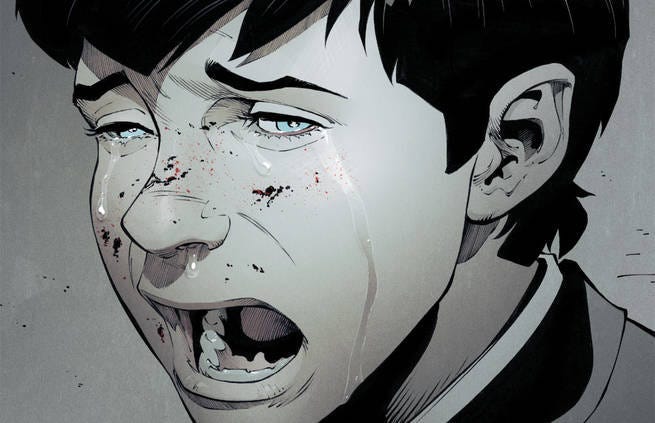How you might actually be the Batman.
Do you share these similar traits that are shown within Batman's character. If so, you might need to buy a cape and become moody 24/7.
Batman encompasses many philosophies that are showcased in our meshed philosophies. Throughout his countless interpretations in movies, comics, and video games certain themes continue to arise. The Batman, although flawed, maintains an ethical duty that is both strict and universal.
Stoicism
This a philosophy that we have all encountered at some time or another, whether it be through Marcus Aurelius, or seeing the countless memes that reference this philosophy. But how does it apply to the Batman?
Batman is a stoic character for several reasons. Firstly Batman is characterized by his calm demeanour that fails to falter, even in the face of certain death, which is a situation he finds himself in a little too much.
Epictetus
This ancient Greek philosophy encourages the individual to show a level of control in all facets of life. The stoics, specifically Epictetus believed in the importance of developing a mental resilience in the face of life’s harsh realities. He is quoted as saying, “It's not what happens to you, but how you react to it that matters.” This phrase serves as a foundation for all Stoic thought, as they believed that our internal processes should be reserved for rational thought.
Occupational Hazard
Emotions can serve to disrupt living if we allow them to run rampant. The Batman cannot afford to allow his past traumas to trigger certain emotions whilst he is fighting crime, as he will be placed in circumstances that’ll lead to his demise. A perfect example of this situation is found in the movie The Dark Knight Rises. In this, Batman is pitted against Bane. During their first fight, Batman fights with anger, leading to his humiliating defeat, later however Batman learns to regain his composure and defeats Bane. Again the words of Epictetus beckon back into my brain when he wrote, “Any person capable of angering you becomes your master.”
Deotology
Kant
This philosophy speaks to a set of universal moral and ethical standards that individuals should feel obligated to adhere to at all times. It preaches virtue which is granted to the individual by living in adhering to peaceful actions that serve to better themselves and the world around them.
18th century Philosopher Immanuel Kant is the influence and origin of Deontological ethics. His instrumental theories and philosophy preach ethical conduct and rejection of consequentialism which condones means to an end.
No Killing Rule
Perhaps Batman’s most infamous characteristic is his refusal to kill anyone, as a result of what transpired in his youth; with the murder of his parents. Bruce Wayne realized that certain things were inherently right and wrong, and he chose to become Batman to enforce a universal ethical code on Gotham’s criminals.
The Joker being Batman’s shadow tests Batman’s deontological ethics by pushing the envelope of what is the Batman is willing to take. His actions in the comics make Batman question whether his rule should be broken in special cases like the Joker, who will continue to kill and cause devastation in Gotham to encourage Batman to break his one rule.
Is it Useful?
Instances like this have Readers questioning the validity and utility of Deontology. In theory, Deotology appears to be a perfect philosophy. It advocates for universal and constant ethical conduct by the individual, however, it fails to account for a reality where other individuals might abuse that trait in people, like the Joker.
In no reality will Joker ever assume an ethical character, thus this realization further drives Batman towards a wall questioning whether his strict code is truly aiding the future of Gotham; or if he is becoming responsible for the countless citizens killed and/or to be killed by the Joker.
A Personal Philosophy
The Root
We can spend countless hours deducing which philosophical schools Batman adheres to and which specific concepts embody his character. His philosophy can be entirely understood by the incident that occurred in his youth; the infamous murder of his parents.
Pain, sadness, and anger are the true motivators of the Batman. Due to a traumatic incident, the world became painted in black and white for a young Bruce Wayne. Criminals were bad and regular people were good. This simplified outlook allowed a fresh Batman to believe the validity of his actions, however, as he matured doubts began to spring regarding the outcomes of his actions.
As we can see in countless stories, such as the Arkham videogame series. A mature Batman is without the rage that once embodied him during his youth, this refined, sad and poignant Batman questions the very nature of his actions. A more introspective Batman becomes vague and grey, escaping concrete notions of certain philosophical themes.
Conclusion
Batman’s character relates greatly to two distinct philosophies, Stoicism and Deontology. Stoicism is embodied in Batman’s calm demeanour and Deontology is reflected in his strong ethical code. Batman, however, is more than just those two philosophies. His character is a reflection of pain, sadness and anger. These three seem to fuel many of Batman’s thoughts, and actions.
Are there any philosophies I haven’t touched on that reflect Batman? Let me know.
(I don’t really know where you could let me know. You could email me at philosopylearned@outlook.com)







